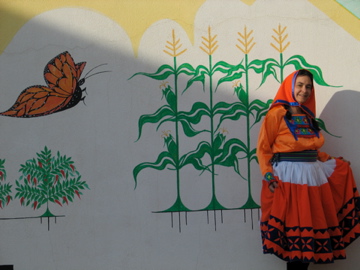Surphuy
"This 'carnaval' song is about a young girl who has come to the dance one year and her dance partner from last year has not stayed with her.... The chorus of 'surphuy, wakanki, pallchay' are the names of the flowers that are picked and often worn as part of the very special and beautiful carnival outfits..." –Daria, song contributor

Surphuy
Surphuy Flowers
Carnival Song
Carnival Song
(Quechua)
(English)
Chorus:
Isariway, chutariway, surphuy, wakanki, pallchay
Isariway, chutariway, surphuy, wakanki, pallchay
Surphuy t'ika pallaspaiki
Hakay macq'ta haku niwan
Kayna wata tusuqmasiy
Maytaq kunan kaypinachu?
T'ika pallana pampapiqa
Iru Ichullas winayusian
T'ika pallana pampapiqa
Raki rakillas winayusian
Chaychus mana yuyarispa
Noqari mana waqaykuyman
Chorus:
Pull, grab… surphuy, wakanki, pallchay flowers
Pull, grab… surphuy, wakanki, pallchay flowers.
In the place that we picked surphuy flowers
That young man told me to come with him.
Last year's dance partner,
Where is he now?
In the place where we picked flowers
Only the weed known as Iru Ichullas is growing.
In the place where we picked flowers
Only the weed known as Raki rakillas is growing.
If you don't remember me
Then neither will I cry for you.
Notes
Daria sent us this song with the following note:
"Surphuy is a 'carnaval' song from the department of Apurimac in central Peru. (A department in Peru is like a state in many other countries).
Surphuy is also a dance from that region. The chorus of 'surphuy, wakanki, pallchay' are the names of the flowers that are picked and often worn as part of the very special and beautiful carnival outfits.
Sometimes the lyrics to carnival songs don't seem to make a lot of sense. This is because they are sung to keep the dance going. But most carnival songs have a theme - like boys teasing girls or lost love. This 'carnaval' is about a young girl who has come to the dance one year and her dance partner from last year has not stayed with her. At the end of the song she says… 'If you do not remember me, then neither will I cry for you'.
The language of this song is Quechua, the main language of the Incan empire, dialects of which are still spoken in much of rural Peru, Bolivia and Ecuador today."
You can hear Daria's world music for children on her website or her SONQO website.

Thanks and Acknowledgements
Contributed and translated by Daria Marmaluk-Hajioannou
The photo shows traditional clothing from Apurimac (where this song is from).
Many thanks to Daria for sharing this song, the photo and recording with us!
Yusulpaiki!

























